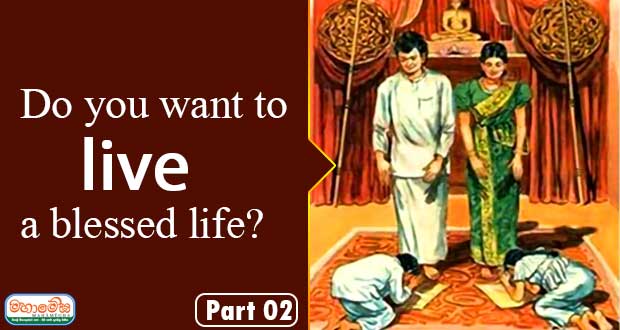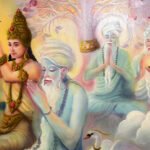It is a great misfortune, if someone is unable to go for refuge in the Noble Triple Gem. Simply murmuring the words without understanding their real meaning will not make one find refuge in the Noble Triple Gem. At present most Buddhists don’t have conviction towards the Buddha, Dhamma and Sangha. This is the reason why they become victims of other fundamentalistic religions, wrong views and lots of other lewd addictions and obsessions. There is absolutely no way of averting this danger without going for refuge in the Noble Triple Gem. If someone gets the opportunity to go for refuge in the Triple Gem, knowing the actual meaning of the Buddha, Dhamma and Sangha that is the greatest blessing one can have in this life.
Lord Buddha said, “Dear Ananda, if you have a feeling towards your friends and relatives, if you have compassion towards them and if you think they will benefit by listening to you, you should help them to be steadfast in three things. What are they; you should make them abide by unshaken confidence towards the Buddha, unshaken confidence towards the Dhamma and unshaken confidence towards the Sangha”. “Dear Ananda, these four fundamental elements which are, Patavi, Apo, Thejo and Vayo (Solid, Liquid, Energy and Air) will definetly undergo change. But if one has unshaken confidence towards the Buddha, Dhamma and Sangha, his conviction towards the Noble Triple Gem will remain unchanged”. “Dear Ananda, if a devotee has unshaken confidence towards the Buddha, Dhamma and Sangha, there is absolutely no possibility for him to born in hell, the animal world or the Spirit worlds”.
These are the exact words spoken by the Buddha. Therefore, we should pay attention to this noble preaching and go for refuge in the Triple with urgency. We must always contemplate the qualities of the Buddha, Dhamma and Sangha. The Triple Gem is the greatest wealth in this world. If one has the ability to gain this wealth, he will not be poor at all. So let us be steadfast in the conviction we have in the Noble Triple Gem and gain unlimited happiness and bliss.
Qualities of the Dhamma
Swākkāthō Bhagawathō Dhammō : The Dhamma that Lord Buddha expounded is excellent in the beginning, excellent in the middle and excellent in the end. The excellent beginning is the Virtue, the excellent middle is the Samadhi and the excellent end is the Wisdom. This is the perfect path which leads to Nibbana.
Sandittikō : The Dhamma that Lord Buddha preached us with utmost compassion can be realized in this very life. This noble Dhamma can be developed in the order of Virtue, Concentration and Wisdom. (Sila, Samadhi and Pragna) We call the noble Dhamma “Sandittika” because we can experience the results in this life itself.
Akālikō : The Dhamma that Lord Buddha preached us won’t change from time to time. Dhamma is always the truth and we experience this truth everyday. Furthermore, this noble Dhamma could be realized during any period of time. This means the noble Dhamma could be realized irrespective of time. (in the past, present or the future) We call this noble Dhamma “Akalika” because it doesn’t belong to any specific time period.
Ēhipassikō : The Dhamma that Lord Buddha expounded can be presented to anyone openly. There are no mystery teachings or advice in the Dhamma. The Dhamma can be shown clearly and openly to anyone, just like the sun or the moon. As the Dhamma can be openly presented to gods and men, to come and examine it with rational thinking, the Dhamma is called “Ēhipassika”.
Opanikō : In order to continuously develop oneself in accordance with Lord Buddha’s teaching, one must listen, memorize, practice verbally, contemplate and practice according to Dhamma. One should be virtuous to get the maximum benefit out of Dhamma. Dhamma is called “Opanika” because one has to learn and practice Dhamma individually.
Pachchaththañ Wēdhithabbō Wiññuhī : The noble Dhamma that Lord Buddha preached us, can only be realized by a wise person who may belong to any nationality or cast. But this wise person should be honest and straight forward and he needs to be without shrewdness or craftiness. If there is a wise person with these qualities who practices Dhamma, he will realize according to his own wisdom. This is why we call the noble Dhamma, “Pachchañ Wēdhithabbō Wiññuhi”.
Sanjeewani Ambagahawatta -Sydney-












Recent Comments